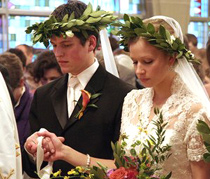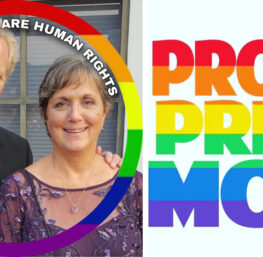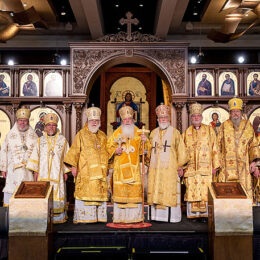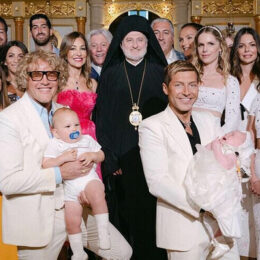 by Selwyn Duke –
by Selwyn Duke –
The big news on the culture-war front is a federal court’s striking down of Proposition 8, California’s constitutional amendment protecting marriage. In a two-to-one ruling, the United States Court of Appeals for the Ninth Circuit wrote, “The people may not employ the initiative power to single out a disfavored group for unequal treatment and strip them, without a legitimate justification, of a right as important as the right to marry.”
Now, I’m not sure why the judges mention a “disfavored group,” as if singling out a “favored” one for unequal treatment would be okay. As far as I know, the 14th Amendment, on which the court based its ruling, doesn’t offer equal protection to only those the current fashions deem “disfavored.” Thus, I think this is an example of emotionalism influencing a ruling and its language, sort of as if a judge sentenced a defendant and, adding an adjective, announced him as “stupid” Mr. Smith. Calling a group “disfavored” is similarly a subjective judgment. This is not the only thing the judges were subjective about, however.
Speaking to bias, some may point out here that the Ninth Circuit is the most overturned court in the nation and that the two judges who ruled against Prop. 8 were appointed by Democrats. Yet the reality is that they’re hardly alone: virtually everyone — including conservatives — misses the 800-pound gorilla with the pink tutu and rainbow flag in the middle of the marriage debate.
The court’s reasoning is that a state cannot deny homosexuals the right to “marry” if that right has already been established for others. This certainly seems to accord with the 14th Amendment, which reads, “No State shall make or enforce any law which shall abridge the privileges or immunities of citizens of the United States … nor deny to any person within its jurisdiction the equal protection of the laws.” So, by the judges’ lights, since Prop. 8 abridges for one group a privilege afforded everyone else, it is unconstitutional.
But what really is the central issue here? It isn’t whether marriage is a right or a privilege; it isn’t whether it is covered under the Constitution. It isn’t even whether or not homosexuals have a right to “marry.” The crux of the matter is this: what is this right or privilege?
If the court rules that there is a right to a certain thing, it must know what that thing is. Yet if the court accepted that the thing called “marriage” is the union between a man and woman, there would be no debate. The judges would simply state that, just like anyone else, homosexuals have a right to marry — to form that time-honored union between themselves and a member of the opposite sex.
Now, some will say the court accepts that there has been a redefinition of marriage. If so, they had best tell us what it is. Because, you see, our leftist marriage engineers have not redefined marriage.
They have undefined it.
They have not said that marriage is the union between any two people. If they did, they’d render themselves just as “exclusionary” and “discriminatory” as those they decry and relinquish a hammer with which they bludgeon tradition. They have not offered any alternative parameters for marriage. They’ve simply implied that the correct definition — the one accepted for millennia in Western civilization — is wrong.
Yet if these leftists cannot say what marriage is, how can they be so sure about what it isn’t? If they cannot offer a definition they’re certain is right, how can they be so confident that the right definition is wrong?
But the point is this: the court obviously doesn’t accept the definition of marriage embraced by most people worldwide today. If it did, it would have ruled as indicated earlier. Yet there also is no noted alternative definition by which to go. Thus, it seems that before the judges could rule on the right to this thing called marriage, they’d have to rule on what this thing is in the first place. So have they ruled that there is a right to they-know-not-what.
Of course, the judges certainly understand marriage to be some kind of legally sanctioned union between or among different parties. But this takes in a lot of territory. If this is all it is and everyone has a right to it, how can we deny it to polygamists (and their conception of marriage has infinitely more historical precedent than does faux marriage)?
This is where some roll their eyes and say that these things will never happen. But while such scoffing is rhetorically effective, it’s not very intellectual. I’ll first point out that people in the 1950s would have likewise laughed off the notion that granting homosexuals the right to “marry” would be a major social and legal movement 50 years later. More significantly, however, ideas matter. The precedents we set matter. And when you undefine something, nothing is excluded. No boundaries means no limits.
This is why the left’s actions do, in fact, threaten marriage. To fail to respect the institution’s time-honored definition and also refuse to offer any alternative definition is to seek to destroy the edifice without a plan for what will take its place. It is to imply that marriage can mean anything. And if something can mean anything, it means nothing.
As for conservatives, they have been suckered again. Without even realizing it, they have allowed the left to frame the debate — as a matter of rights — when it is first and foremost a matter of definitions. To argue it as a matter of rights is to lose the debate; to control the definitions can render that debate irrelevant.
This is why, mind you, I would not have written Prop. 8 as its framers did: “Only marriage between a man and a woman is valid or recognized in California.” Instead, it should have been, “Marriage is hereby legally defined as a union between a man and a woman.” The actual text gives the courts wiggle room to find in favor of currently invalid or unrecognized “marriages”; the suggested text makes it so that there is nothing else to find in favor of. (Of course, ambitious judges can find a way around anything, but they’d have to do a bit more creative constitutional trampling.)
Yet controlling the definitions starts with controlling the vocabulary. For a definition won’t take hold in society unless the word it defines first does. This is why conservatives should never use the term “gay marriage,” as this is an explicit acknowledgement that such an institution exists. Nor should they use “heterosexual marriage,” for what is the other side of that coin?
What is most readily accepted is that which is assumed. From the get-go, conservatives should have insisted that marriage is marriage, a union between a man and woman and nothing else. This would have put odd alien fantasies about marriage, whatever they may be, in perspective. Because you cannot have a right to that which doesn’t exist.
HT: American Thinker




Yeah, lots of good points you make here.
I think we need to establish that marriage is about the right to procreate offspring together using the couple’s own genes. And then we need to establish that people only have a right to procreate by combining their natural gametes with someone’s of the opposite sex. Those should be federal laws.
Right, John Howard. Because everyone knows that gays and lesbians can’t get someone of the opposite sex to donate their gametes in order for them to have a child. And everyone knows that creating offspring is the only reason two people get together.
Marriage was never focused on having children. It was always about a way to transfer property. Go back as far as you can into the history of marriage. It was a way to join two families together in order for both families to get something they wanted. It was a way for the man to gain more property. Children solidified the marriage but they were not the reason for it. Don’t even let me bring up polygamy, which was the norm all throughout the bible.
Now, let’s move forward into the recent past, where marriage, especially in the U.S., has become about finding your soul mate. I seriously doubt that any couple thinking about marriage look at each other and say “Boy, what great kids we’re going to make together.” No, couples start out being attracted to each other, they become friends, and then they realize that friendship has turned into something more. They think about how great it would be to spend the rest of their lives with this person. Having children is a small part of the thought process, not the overwhelming driving force.
When you decide to make procreation the reason for marriage, then you have to decide what to do with those marriages that do not produce children, or those marriages that occur long after child-bearing age is done and over with. Do we allow those marraiges to continue?
Too many things to regulate when it’s easier to just say Marriage is between two people who are sane and of the age to give legal consent. Too bad so many want to bring things into it that have no validity there.
Go back to the beginning of marriage and you’ll find that marriages always were allowed to create offspring together from the couple’s own genes. There has never been a marriage that was prohibited from having sex and possibly procreating together, and we should not say that it is fine and dandy for a marriage to be prohibited from conceiving offspring together using the couple’s own genes. Eugenicists like Sanger and Saleeby wanted to strip procreation rights from marriage and issue separate parenting licenses to conceive a kid, and we are now realizing their dream via Liberal Eugenics of sperm banks and commercial PGD, and talking about how marriage doesn’t mean the right to conceive children. Sorry but we need to draw a line and say that marriage DOES mean the right to conceive biological offspring together using the couple’s own genes, and stop people who want to say it doesn’t.
And same-sex couples should not be allowed to attempt to conceive offspring together using their own genes, however it might be attempted. People should only be created by joining a man and a woman’s unmodified genes. A married man and woman, preferably, but my proposal doesn’t prohibit unmarried conception or donor sperm or anything that is currently done, it only prohibits stuff that hasn’t been done. Because you are right, there would be too many things to regulate if we let people start making babies from modified gametes or synthesized DNA or whatever they wanted to.
Teri Simpkins here does not have it right. Marriage today as a government purpose is about chldren and the justification for the benefits. Sure at one time in society civil marriage might have been about getting and transferring property. Ahh but that was before government recognition and involvement in the institution. Now the government is involved and bestows benefits.
The change came about over a century ago when it became a public purpose institution. Attaching mothers and fathers to their children became that public institution. It is why the government recognizes it and bestows benefits to it. These benefits are procreation incentives offered by the state when you get married. These benefits are not available to singles because singles cannot procreate on their own. You have to understand that if it was just about who you love, property, and not about children then there would be no justification for state involvement. The procreation benefits could not be justified to the people who are single. If children are not important then how can these benefits be denied to single people but given to homosexuals. So marriage today is about children because that is precisely the reason for the state involvement.
Has anyone else here noticed besides me the contradiction in the post from Teri Simkins. Claiming support for marriage to recognize any two adults because it is about property and love but not children yet still wanting the state recognition and procreation benefits where the singles community gets the shaft. This is nothing more than the homosexuals version of corporate welfare.
The final point from Ms. Simpkins deals with marriages that do not produce children and what to do with them. The marriage license is given on the assumption that you are going to procreate. The benefis are procreation incentives and are not requirements. Therefore leave those marriages as they are. Fortunately the process is working so if it is not broke then do not fix it. For every childless marriage there are people like my sister who procreated seven children to make up for those who did not.
One very last and important point. These procreation benefits were created before the nanny state. This means they are more important now than before. Today we have Social Security and other entitlements for when you get older. It is the offspring of these marriages that pay the entitlement taxes. So the public purpose of marriage bringing about children is even more important today.
“The marriage license is given on the assumption that you are going to procreate. ”
Not if they are siblings, or if it’s a mother and son, or a step mother, or if either of them is under 18, or already married to someone else. So your statement is wrong, we don’t just give a license to any old couple that could potentially procreate. We only give it to couples that we approve of procreating, or I should clarify, we only give it to relationship types that we approve, or actually, that we don’t prohibit, to procreate offspring together.
“Sure at one time in society civil marriage might have been about getting and transferring property.”
Come on there were lots of ways to get and transfer property besides marrying someone! What marriage did was say these two people will have sex together and bear children together, and the property stuff flowed from that. The property went to the person you had children with. Or actually, when you married, you became one person with one estate, and the spouse that lived longer didn’t inherit the state, they just continued to own it, as they had since they married each other.